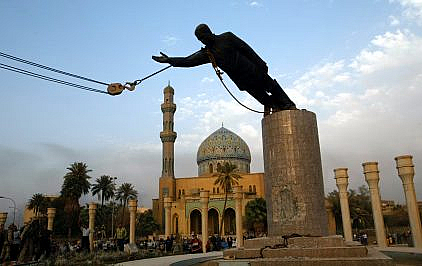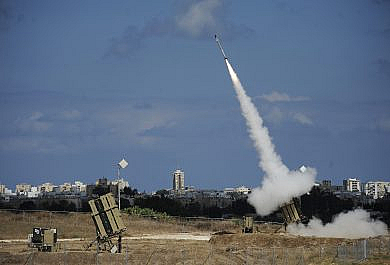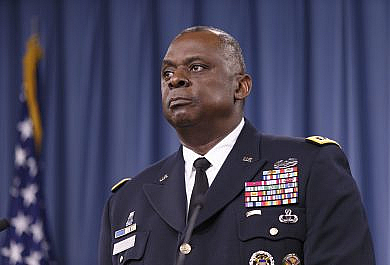Twenty years ago this week, the United States invaded Iraq. The Iraq War would claim thousands of lives, reshape US politics, and American forces remain in Iraq to this day.
Summary
Twenty years ago this week, the United States invaded Iraq. The Iraq War would claim thousands of lives, reshape US politics, and American forces remain in Iraq to this day.
- On March 20, 2003, the United States and a coalition of 30 allies including the United Kingdom, Australia, and Poland invaded Iraq and overthrew the dictatorial regime of Saddam Hussein. US and allied intelligence believed Hussein possessed weapons of mass destruction (WMDs).
- Iraqi belligerence and refusals to accept UN weapon inspectors prompted US airstrikes in 1998 and was the defining security concern in the region in the dozen years between the 1991 Persian Gulf War to liberate Kuwait from an invading Iraqi army and the US-led invasion in 2003.
- Baghdad fell in April 2003, and President George W. Bush declared the end to major combat operations in the infamous “Mission Accomplished” speech on May 1, 2003. A sectarian insurgency and the failure to find WMDs dominated 2004 before parliamentary elections were held in 2005. Later that year, Iraq would descend into a sectarian civil war of shocking brutality.
- After gaining support from Sunni Tribal leaders in the “Anbar Awakening,” President Bush ordered “the surge” in 2007 of 30,000 troops to fight the insurgency. By the time Barack Obama took office, Iraq was fragile but stable.
- Obama withdrew US troops from Iraq in 2011 to fulfill a campaign promise, but less than 3 years later Obama would be forced to redeploy troops to Iraq to defeat the Islamic State, which rose to power in the vacuums created by Obama’s premature withdrawal and his failure to enforce his own “red line” in Syria, worsening the Syrian Civil War.
- Twenty years after the “shock and awe” campaign brought down Saddam’s horrific dictatorship, roughly 2,500 troops remain stationed in Iraq in Baghdad and the Kurdish-controlled north. US troops remain in Iraq to ensure the country’s continued stability and as a bulwark against Iran.
- Like other conflicts, the Iraq War inspired a number of films. “The Hurt Locker” won the Academy Awards for Best Picture and Best Director, along with several other Oscars, for its portrayal of an explosive ordinance disposal (EOD) team. “American Sniper” is a biographical film about Chris Kyle, a real-life hero whose story ends in senseless tragedy.
- Several contemporary documentaries are available on streaming service, including “Baghdad ER,” a documentary about life in a Green Zone military hospital in Baghdad during the worst days of sectarian violence in 2006. HBO’s “Alive Day Memories,” produced by the late James Gandolfini, tells the stories of gravely injured Iraq War veterans, many of them amputees, and their journeys to recovery.
- As the Associated Press reported, Baghdad today is “throbbing with life and a sense of renewal, its residents enjoying a rare, peaceful interlude in a painful modern history…. In a suburb once a hotbed of al-Qaida, affluent young men cruise their muscle cars, while a recreational cycling club hosts weekly biking trips to former war zones. A few glitzy buildings sparkle where bombs once fell.” Over 300,000 Iraqis were killed between 2003-2019, yet today, young Iraqis are “hopeful about nascent freedoms and the opportunities to pursue their dreams.”
![]()
- The New York Times published a short documentary featuring interviews with troops of the U.S. Army, 2nd Battalion, 3rd Field Artillery Regiment (aka the Gunners), who served in Baghdad in the early days of the invasion. The Gunners were the subjects of the 2004 documentary “Gunner Palace,” and the surviving members of the unit reflected on their role in the conflict as well as the men they lost to I.E.D. attacks in the last months of 2003.
- As the Washington Post reported, the children of the troops killed in Iraq are now all grown up and wrestling with their parents’ legacies. The Post interviewed Brandon Whiterock, the son of Lori Piestewa, a 23-year-old soldier who was the first American woman killed in Iraq in March 2003. More than 3,000 children lost at least one parent in Iraq, a number that’s almost certainly a low estimate. Keshia Jeffries Cobb spoke with the Post about the legacy of her late father, Victor W. Jeffries, while Erik Suarez del Solar shared his only memory of his father Jesus Suarez del Solar. Maileigh King and her mother Kira shared the story of Adam King, father and husband, who died of suicide a week after leaving the army.
- Much of the coverage of the anniversary is US-centric, but as the Guardian pointed out, the decision to join with the US and invade Iraq destroyed the British public’s trust in its politicians and tarnished the left-wing Labour Party of then-Prime Minister Tony Blair in successive elections. The loss of trust in the British government caused by the War in Iraq may also have contributed to the 2016 Brexit vote to leave the European Union.
![]()
- Fox News interviewed Delta Force operators who reflected on their time hunting down Saddam Hussein. Delta Force operators Chris VanSant and Craig “Chili” Palmer focused on hunting down the “deck of cards,” or the most-wanted government officials in Iraq. VanSant and Palmer would take part in the December 2003 raid that finally captured Saddam.
- Eli Lake argues in Commentary that the Iraq War “wasn’t the disaster everyone now says it was.” Lake writes that despite the many mistakes of the invasion and massive corruption in Iraq today, Iraq is better off in 2023 than it was in 2003. Life expectancy and GDP have surged, and the country has held six consecutive parliamentary elections since 2005. Iran’s influence remains limited, and the country is no longer under the thumb of a “sadistic crime family.”
- National Review published a series of articles assessing the Iraq War from several different perspectives.
- John O’Sullivan examines why the US invaded Iraq and argues the reasons are more complex than are widely understood today.
- Noah Rothman declares “mission partly accomplished,” and argues the US should acknowledge the invasion’s benefits. “We cannot go back in time and fix the mistakes America made in Iraq. But we cannot move forward if we languish in the self-defeating notion that America only made mistakes in Iraq.”
- Elbridge Colby called the war “a great, historic error.” Colby writes, “Iraq was not merely an ill-starred but advisable or noble adventure. The war was an error in and of itself, and the foreign-policy approach that led to it is wrong for America. To be equally clear: Iraq was not a matter of deceit; President Bush and his team genuinely believed they were doing the best thing for the nation. But, as in the famous aphorism, the decision was worse than a crime: It was a blunder.”
- Kori Schake cautions against “learning too much from Iraq.” Schake brings up the under-appreciated “psychological” effects of working in the immediate aftermath of 9/11. Schake “was struck by the worry among the president’s senior team that every day could be another 9/11… Had the same problems regarding Iraq loomed even a couple of years later rather than in 2002–03, the Bush administration would have likely chosen to manage them differently. Fear skewed its risk tolerance.”
Author’s Take
The author’s late uncle, Timothy J. Moore, served in the Air Force for nearly twenty years and deployed to Iraq shortly after the invasion. Tim was an Air Traffic Controller in Baghdad and served two tours of duty in Iraq during Operation Iraqi Freedom. While Tim returned home safely, he passed away unexpectedly five years ago this month. He is dearly missed.
© Dominic Moore, 2023






